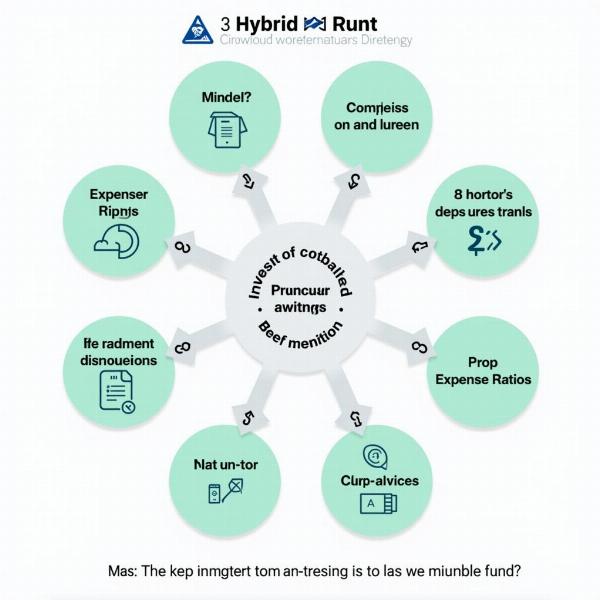Understanding the concept of hybrid funds can be crucial for anyone looking to diversify their investment portfolio. But what exactly does “hybrid fund” mean in Hindi, and how do these funds work? This guide will delve into the meaning of hybrid funds (हाइब्रिड फंड), their various types, benefits, and considerations for Indian investors.
What is a Hybrid Fund (हाइब्रिड फंड)?
A hybrid fund, also known as a balanced fund, invests in a mix of asset classes, primarily equity (stocks) and debt (bonds). This blend aims to provide both growth potential from equities and stability from debt instruments. In Hindi, it is commonly referred to as हाइब्रिड फंड (hybrid fund) or संतुलित फंड (balanced fund). The proportion of equity and debt can vary depending on the specific fund’s investment objective. This allows investors to achieve diversification within a single fund, mitigating risks associated with investing solely in one asset class.
Types of Hybrid Funds in India
There are several types of hybrid funds available in India, each catering to different investment goals and risk appetites. These include:
- Aggressive Hybrid Funds: These funds invest predominantly in equities (65-80%) and a smaller portion in debt (20-35%), aiming for higher growth potential with moderate risk.
- Conservative Hybrid Funds: These funds invest a larger portion in debt (70-80%) and a smaller portion in equities (20-30%), prioritizing stability and income generation.
- Balanced Hybrid Funds: These funds maintain a relatively equal balance between equity and debt, typically around 50:50, aiming for a balance between growth and stability.
- Dynamic Asset Allocation Funds: These funds actively adjust their asset allocation between equity and debt based on market conditions and valuations.
- Multi-Asset Allocation Funds: These funds invest in multiple asset classes, including equities, debt, gold, and real estate, offering further diversification.
Benefits of Investing in Hybrid Funds
Investing in hybrid funds offers several advantages, especially for Indian investors:
- Diversification: Hybrid funds provide instant diversification across asset classes, reducing the impact of market volatility on the overall portfolio.
- Professional Management: Experienced fund managers actively manage the portfolio, making investment decisions based on market analysis and research.
- Convenience: Investing in a single hybrid fund is easier than managing separate investments in equities and debt.
- Tax Efficiency: Certain hybrid funds offer tax benefits under Indian tax laws.
- Suitability for Various Goals: Different types of hybrid funds cater to various investment goals, whether it’s long-term wealth creation or regular income generation.
Things to Consider Before Investing
While hybrid funds offer numerous benefits, it’s important to consider the following factors:
- Risk Tolerance: Assess your risk appetite before choosing a hybrid fund. Aggressive hybrid funds are suitable for higher risk tolerance, while conservative hybrid funds are better for risk-averse investors.
- Investment Horizon: Consider your investment timeframe. Long-term investors can opt for more equity-oriented hybrid funds, while short-term investors may prefer debt-heavy options.
- Expense Ratio: Compare the expense ratios of different hybrid funds. Lower expense ratios mean higher returns for the investor.
- Past Performance: While past performance is not indicative of future results, it can provide insights into the fund manager’s track record.
 Factors to Consider Before Investing
Factors to Consider Before Investing
Conclusion
Hybrid funds offer a convenient and diversified investment option for Indian investors seeking a balance between growth and stability. Understanding the meaning of hybrid fund (हाइब्रिड फंड) and its various types is crucial for making informed investment decisions. By carefully considering your investment goals, risk tolerance, and other factors, you can choose the right hybrid fund to achieve your financial objectives.
FAQ
- What is the difference between an aggressive and conservative hybrid fund? Aggressive hybrid funds invest a larger portion in equities, aiming for higher growth, while conservative hybrid funds invest more in debt, prioritizing stability.
- Are hybrid funds tax-efficient? Some hybrid funds offer tax benefits under Indian tax laws. Consult a financial advisor for specific details.
- Who should invest in hybrid funds? Hybrid funds are suitable for investors looking for a diversified investment option with a balance of growth and stability.
- How do I choose the right hybrid fund? Consider your risk tolerance, investment horizon, and financial goals when selecting a hybrid fund.
- What is the minimum investment amount for hybrid funds? The minimum investment amount can vary depending on the fund. Consult the fund’s offer document for details.
- Can I withdraw my money from a hybrid fund anytime? Most hybrid funds offer liquidity, allowing investors to redeem their units, subject to certain terms and conditions.
- Where can I learn more about hybrid funds? Consult a financial advisor or visit the websites of mutual fund companies for more information.
Meaning-Hindi.in is your one-stop solution for all your Hindi translation needs. We offer a wide range of professional translation services, including business and commercial document translation, legal and certified translation, technical and user manual translation, website and localization services, educational and academic document translation, express translation, and specialized translation services. For accurate and reliable Hindi translations, contact us at [email protected] or call us at +91 11-4502-7584. Meaning-Hindi.in can help you bridge the language gap and achieve your communication goals.